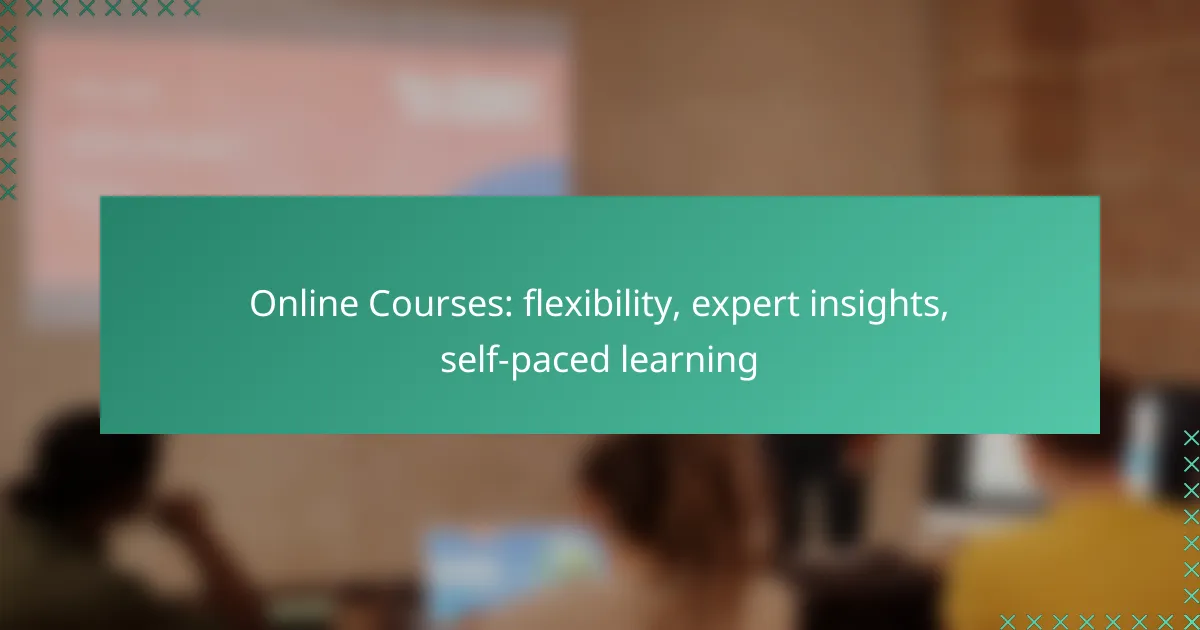Online courses provide a flexible learning environment, allowing students to tailor their educational experience to fit their personal and professional lives. With access to expert insights and practical applications, learners can engage with seasoned professionals and real-world scenarios. Additionally, the self-paced nature of these courses empowers individuals to progress through the material at their own speed, accommodating various learning styles and commitments.

How do online courses provide flexibility in learning?
Online courses offer flexibility in learning by allowing students to choose when and how they engage with the material. This adaptability caters to diverse schedules, enabling learners to balance their studies with personal and professional commitments.
Self-paced learning options
Self-paced learning options allow students to progress through course materials at their own speed. This means learners can take extra time on challenging topics or accelerate through familiar content without the pressure of a fixed schedule.
Many platforms offer a range of self-paced courses, from introductory to advanced levels, making it easier to find a course that matches individual learning styles and needs. This structure is particularly beneficial for those balancing work or family responsibilities.
Access from anywhere
Online courses can be accessed from virtually any location with an internet connection. This means learners can study from home, a café, or while traveling, making education more accessible than traditional classroom settings.
This global access is particularly advantageous for individuals in remote areas or those with mobility challenges, as it removes geographical barriers to quality education. Just ensure you have a reliable internet connection to avoid interruptions.
Variety of formats
Online courses come in various formats, including video lectures, interactive quizzes, and written materials. This variety caters to different learning preferences, whether you prefer visual, auditory, or kinesthetic learning styles.
Additionally, many courses incorporate multimedia elements, such as podcasts or infographics, to enhance engagement and retention. Choosing a course format that resonates with you can significantly improve your learning experience.
Scheduling flexibility
Scheduling flexibility is a key feature of online courses, allowing students to choose when to study. Many courses do not have strict deadlines, enabling learners to fit their education around work, family, or other commitments.
However, some courses may have optional live sessions or deadlines for assignments, so it’s essential to review the course structure before enrolling. This way, you can select a course that aligns with your availability and learning goals.

What expert insights can be gained from online courses?
Online courses provide valuable expert insights through diverse teaching methods, industry knowledge, and practical applications. Participants can learn from seasoned professionals, engage with real-world scenarios, and build connections that enhance their learning experience.
Industry-leading instructors
Online courses often feature instructors who are recognized leaders in their fields. These experts bring a wealth of experience and current industry knowledge, ensuring that learners receive relevant and up-to-date information. For instance, a course on digital marketing may be taught by a professional who has successfully managed campaigns for major brands.
When selecting a course, consider the instructor’s background, credentials, and previous student feedback. This can help ensure that you are learning from someone who not only understands the theory but also has practical insights to share.
Real-world case studies
Many online courses incorporate real-world case studies to illustrate concepts and strategies in action. These case studies allow learners to analyze successes and failures, providing a deeper understanding of how theories apply in practice. For example, a course on project management might include a case study of a successful tech startup’s product launch.
Engaging with these case studies can enhance critical thinking skills and help learners apply what they’ve learned to their own situations. Look for courses that emphasize practical examples and encourage discussion around these cases.
Networking opportunities
Online courses often facilitate networking opportunities with peers and industry professionals. Many platforms include forums, group projects, or live Q&A sessions, allowing participants to connect and share insights. This networking can lead to collaborations, mentorships, and job opportunities in the future.
To maximize networking benefits, actively participate in discussions and reach out to fellow students or instructors. Building these relationships can be as valuable as the course content itself, providing ongoing support and resources beyond the classroom.

What are the benefits of self-paced learning?
Self-paced learning allows individuals to progress through educational material at their own speed, offering flexibility and control over their study schedules. This approach caters to diverse learning styles and commitments, making it an attractive option for many students.
Personalized learning experience
Self-paced learning enables students to tailor their educational journey according to their unique needs and preferences. Learners can choose topics that interest them, skip content they already understand, and revisit challenging material as needed. This customization enhances engagement and motivation.
For instance, a student may focus on advanced topics in a subject they excel in while spending additional time on foundational concepts that require more attention. This individualized approach can lead to a deeper understanding of the material.
Improved retention rates
Studies suggest that self-paced learning can lead to better retention of information compared to traditional classroom settings. When learners control the pace, they can take the time necessary to absorb and process information thoroughly. This often results in a stronger grasp of concepts and improved long-term recall.
Additionally, learners can implement spaced repetition techniques, revisiting material at intervals that reinforce memory retention. This method is particularly effective for complex subjects, allowing students to solidify their knowledge over time.
Ability to balance work and study
Self-paced learning offers the flexibility needed for individuals juggling work and educational commitments. Students can create a study schedule that fits around their professional responsibilities, reducing stress and enhancing productivity. This balance is crucial for those who may have limited time due to job demands.
For example, a working professional might dedicate evenings or weekends to study, allowing them to integrate learning into their daily routine without sacrificing job performance. This adaptability can lead to a more fulfilling educational experience.

What criteria should be considered when choosing online courses?
When selecting online courses, consider factors such as accreditation, course content relevance, and instructor qualifications. These elements significantly impact the quality and value of the learning experience.
Accreditation and reputation
Accreditation ensures that the online course meets specific educational standards, which can enhance its credibility. Look for courses offered by accredited institutions or those recognized by relevant professional bodies.
Research the reputation of the course provider. Read reviews, check ratings, and seek testimonials from former students to gauge the overall quality and effectiveness of the course.
Course content relevance
Evaluate whether the course content aligns with your learning goals and industry demands. Check the syllabus for topics covered and ensure they are up-to-date and applicable to your field.
Consider the balance between theoretical knowledge and practical skills. Courses that include hands-on projects or real-world applications often provide a more enriching learning experience.
Instructor qualifications
Instructor qualifications are crucial for a valuable online learning experience. Look for courses taught by professionals with relevant industry experience and advanced degrees in their subject area.
Investigate the instructor’s background, including their teaching style and previous student feedback. Engaging and knowledgeable instructors can significantly enhance your understanding and retention of the material.

How do online courses compare to traditional education?
Online courses offer flexibility, expert insights, and self-paced learning, making them a compelling alternative to traditional education. They allow learners to access quality education from anywhere, often at a lower cost and with fewer time constraints.
Cost-effectiveness
Online courses typically cost less than traditional education, as they eliminate expenses related to commuting, housing, and physical materials. Many platforms offer free or low-cost options, with some courses priced in the range of $50 to $500, while traditional degrees can exceed thousands of dollars.
Additionally, online courses often provide access to high-quality resources and expert instructors without the hefty price tag of in-person classes. This affordability makes education more accessible to a broader audience.
Time commitment
Online courses allow learners to set their own schedules, making them ideal for those balancing work, family, or other commitments. Many courses are designed to be completed at the learner’s own pace, which can range from a few weeks to several months, depending on the course structure.
In contrast, traditional education typically requires a fixed schedule with set class times, which can be challenging for busy individuals. This flexibility in online learning can lead to better retention and understanding, as students can revisit materials as needed.
Learning environment
The learning environment in online courses is often more personalized, allowing students to choose where and how they study. This can lead to increased comfort and focus, as learners can create an atmosphere that suits their preferences, whether at home, in a café, or elsewhere.
However, the lack of face-to-face interaction may be a drawback for some. Traditional education fosters social connections and networking opportunities that can be beneficial for career growth. It’s essential to weigh the benefits of a personalized online environment against the collaborative aspects of in-person learning.
